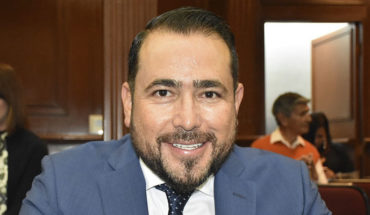
Chile will be the first country in the world to draft a new Constitution in gender parity. There are 77 women and 78 men who make up the constituent body and are tasked with collecting the various demands of the citizens for the elaboration of the new magna letter that will govern in the near future. Historic milestone that marks a before and after for women and also for feminism. On this point, and already with all the information of who the constituents are, the question arises as to whether a feminist perspective will be incorporated into the Convention. “There is certainly a very significant number that is feminist and that at this minute are being articulated. There were 38 in a first group and there are probably many more who declare themselves or recognize feminists. If the Convention is going to have a feminist perspective it will depend on how those key issues can be installed from feminism,” says el Mostrador Braga, the coordinator of the Gender and Equity Observatory, Teresa Valdés.
-What is the incorporation of a feminist perspective into the Constitutional Convention?
-The feminist perspective in the Convention is a way of referring to what is inclusion, the centrality that must have effective equality of all people, regardless of gender, race, any object that is a factor of inequality. But what was mainly aimed at is effective equality. The formal equality that appears today, or the idea of a neutral text, which is supposed to be guaranteed equality when it says ‘men and women’, the truth is that it is not enough. It is then essential to have a principle that concerns equality and non-discrimination, but that this principle is embodied throughout the Constitution, throughout its articulation, so that the State is obliged to guarantee that equality.
Secondly, recognition of unpaid work is central to feminism, which is also called the inclusion of the care work that women do mostly and which is the work of social reproduction, that not only productive work is recognized, but also the enormous contribution to social reproduction that mainly means unpaid work. This also has consequences in terms of how the rights, duties and institutions of the State are structured. Because in substance, this means that national accounts are recognized, that it be evaluated or revalued, as in the case of Ecuador, is valued what is the contribution of women in what is unpaid work. This also has consequences for labour law, i.e. it has consequences on many levels.
Also at the level of equality is the question of having a joint Constitution, that is, that all the collective bodies that have to do with the organs of society – all the organs of the State, all autonomous bodies, etc., etc.- that the whole of society is parity, that is, it is composed of men and women. This would probably have to give rise to an equality law, and as in Spain, with deadlines, for companies and different social bodies to become joint bodies.
Another central element of feminism is women’s reproductive autonomy. Recognition is on different planes. We can talk about political autonomy, economic autonomy…, but the autonomy of the body, reproductive autonomy, which means ending the state’s current guardianship over women’s reproductive decisions, that is, women and pregnant bodies can freely and accountably decide when to have children, with whom they have them and whether they want to have them, and have access to reproductive technologies if that is not possible , but also to the voluntary termination of pregnancy when it is not within what we call voluntary motherhood.
Fundamental also from feminism is that the right to a life free of violence is included. Somehow this patriarchal order, this gender order in which we live is based on violence, even if it is not always physical violence, but it is very violent that on the shoulders of women despite all the social reproduction. That’s what we call structural violence, because when it’s culturally accepted that women by our gender are responsible for care issues, and it’s notonly reproductive tasks, household chores, but also care and dependents, all that is the emotional and emotional dimension, when that is assigned only to women and the expectations in this order, generate many situations of violence and the Constitution would have to think about how it guarantees a life free from violence, gender-based violence , sexual violence against women and sexual diversity.
Another point that is relevant is the language used by the Constitution, a motion was just filed by parliamentarians demanding that language not be changed, that language be used in the Constitution with a series of observations that do not explain, but which clearly point to not considering inclusive language. Inclusive language is key in terms of recognition of all people, when you don’t name you are excluding, you are becoming unvisitable, you are marginalizing from what social conversation is, then inclusive language is very important.
One element that is very significant is the Lay State, that is, that the different religious confessions have their possibility of existing, whatever, but they have no interference with the State. The state cannot be sponsoring or being influenced by different religious creeds. It has to be a lay state, this means that it has to review how they relate from the State to organizations and agencies that are religious, because the lay state has to guarantee the rights recognized at the constitutional level for the whole population and if reproductive autonomy, freedom of conscience, etc., is recognized, this has to be guaranteed in all instances where there are public resources.
-What should gender focus be paid on to the debate on the rules that will govern and regulate the constituent process?
-As for the rules of procedure of the Convention, we have developed a collective with a broad feminist territorial articulation “Elena Caffarena”, which was recently constituted. We are working from Arica to Chiloé, we have been working on a feminist regulation, in the sense of of ensuring parity in all instances, in all committees, committees, tables, presidencies, vice-presidencies, of all instances of the Convention. We are also considering that there are resources for women who have people in their care, are children or are dependents, to have the resources so that they can effectively participate on an equal footing as men in the Convention. This also has to do with the need to ensure internet connectivity… everything that ensures that women, because there are peasant women who were elected, women who are in Iquique, in Copiapó, in Chiloé, places where connectivity is quite problematic and that means ensuring funding for it.
It also means checking if there are conventional women who have to leave their children, that is, how it will be, what the schedules are and also the continuity of functioning, so that the women who live very young can be, or bring their children and be supported with accommodation, or travel periodically to their places.
Another proposal is for an ethics committee and for that committee to be able to receive complaints of what may occur in situations of discrimination, harassment, political, gender or sexual order, and the proposal is for the Convention to have a protocol, we are working on that protocol to prevent, manage and punish gender-based violence that may occur during the year that the Convention will be operating. This, for both conventional and support staff. This regulation also refers to inclusive language to be used and translation into the languages of indigenous peoples, the use of sign languages and the use of braille in the case of non-seers. A special chapter of this regulation is the forms of participation and in that chapter we propose what has to do with forums, with lobbyists, with the possibility that conventional and conventional ones travel to their districts and can develop work accountability activities with their territories, and obviously that means financing to do so, but also that there is the possibility of systematizing the incredible amount of proposals that come out of lobbying or instantiating self-convened. For this we propose that the Convention should have an association with some public universities that may be systematizing.
Another central theme is advertising, transparency, that everything being talked about is public, is open to all citizens, that means streaming, TV channel, but also streaming to community radios, thinking that it is essential that all citizens of this country can participate, know and know what is happening in the Convention.
-Is it possible to make substantive changes in women’s rights while maintaining the current neoliberal system?
-Moving towards a social rule of law, which clearly departs from the current neoliberal system, having a social rule of law is fundamental for women. In this privatized, individualistic model, in which everything is dedicated to individual initiative has tremendous costs for women. When you think about education, health, housing, you have additional costs on women, for a topic that has to do with poverty time. Women not only have higher economic poverty than men, but there is poverty of time. Reproductive work, paid work systematically means – as is currently structured – hours of women’s time. The non-territorialized, non-care support systems means that women have a lot of difficulty, for example, to join the labour market or to develop work other than strictly reproductive ones, so we aspire to a social rule of law.
– The exercise of power in politics has been understood from a male logic – hierarchical and competitive – and the fact that we have for the first time in the world a Constitution written in gender parity certainly marks an important advance and generates expectations in the possibility of achieving effective equality. However, political participation in other areas of power remains very difficult for women. What do you think of this phenomenon?
-Indeed the power has been masculinized – masculine and masculinized – since the installation of the Republic and that is effectively hierarchical and competitive, that is a fact and modifying it is a long process. He thinks that until the year 49 men had a quota of 100%, only the year 49 we began to move forward in breaking that quota of 100%, that we only have a law balancing a joint presentation of lists for Parliament, but that it is absolutely… we saw the result that doesn’t reach 30%. We have this extraordinary alliance that we made women, this cross-cutting alliance that allowed us to negotiate and achieve gender parity, but we cannot stay there, it is obviously necessary to include parity in all elections because it is proven that if there is no affirmative action… that is another condition for the Constitution, that affirmative action tools are used to close the gaps, that is a process, so we think of an equality law that gradually forces the equal participation of women in all instances, that means in universities, the media, mean all areas of social activity , but it’s a process.
What is interesting is the result of the Constitutional Convention, because at the time when parties are forced to carry out paritarian candidacies, in addition to the zebra system and which also establishes a rule of correctness of the results, very good nominations are carried out. I mean, this idea that there are no women, that women are not capable… what demonstrated the election of the Constitutional Convention is that there are many women, women with the capacity to develop campaigns and be elected with a very high vote, and therefore the idea that there are no women is over. This experience has to show that the failure is at the barrier of women’s access to nominations and the conditions of these nominations so that there is indeed progress in women’s participation in the different spheres of power. This refers to instances that are of popular choice, but the others, those that are designation, also require an order, guideline or a law that says that it must conform jointly, that is, government authorities must jointly appoint all instances, directories, commissions, whatever is part of their tools or instruments for public policy or policy. Representation at the international level…, in all instances where the State is present, must ensure that it is present in a peerly present way.





